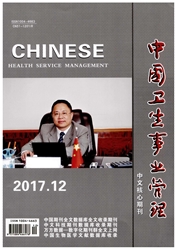

 中文摘要:
中文摘要:
目的:探索皖西村民糖尿病知识、自我效能与健康行为的关系,从而为改善当地居民的健康行为生活方式,进而有效地防控糖尿病提供依据。方法:采用自行设计编制的糖尿病知识量表、自我效能量表、健康行为调查量表对350名村民进行问卷调查,并检测空腹血糖(FPG)了解当地村民的血糖现况。结果:性别对健康行为有显著直接作用(CR=0.200,P〈0.01)。年龄与糖尿病知识呈显著负相关(CR=-0.146,P〈0.01),文化程度与糖尿病知识(CR=0.128,P〈0.05)、自我效能(CR=0.167,P〈0.01)呈显著正相关。糖尿病知识对健康行为也有直接作用(CR=0.225,P〈0.05),同时糖尿病知识也以自我效能为中介对健康行为有间接影响(CR=0.143,P〈0.01;CR=0.140,P〈0.01)。结论:性别、糖尿病知识及自我效能对健康行为存在预测作用,自我效能在糖尿病知识和健康行为之间起中介作用。
 英文摘要:
英文摘要:
Objective To study the relationships among diabetes knowledge, self-efficacy and health behaviors in rural residents of Western Anhui, and provide references for preventing diabetes. Methods 350 cases of rural residents were surveyed with self-designed structured questionnaires. And their fasting plasma glucose was determined. Results Gender had direct effect on health behaviors ( CR = 0.200, P 〈 0.01 ). Age displayed significantly negative association with diabetes knowledge ( CR = -0. 146, P 〈 0. 01 ) , while education degree showed significantly positive association with diabetes knowledge (CR = 0. 128, P 〈 0.05 ) and self-efficacy (CR =0. 167, P 〈 0.01 ). However, diabetes knowledge had not only significantly direct effect on health behaviors (CR = 0. 225, P 〈 0.05 ), but also indirect effect on health behaviors mediating by self-efficacy ( CR = 0. 143, P 〈 0.01 ; CR = 0. 140, P 〈 0. 01 ). Conclusion Factors of gender, diabetes knowledge and self-efficacy had predictive effect on health behaviors. And seff-efficacy can play mediate role between diabetes knowledge and health behaviors.
 同期刊论文项目
同期刊论文项目
 同项目期刊论文
同项目期刊论文
 Toward integrated and sustainable prevention against diabetes in rural China: study rationale and pr
Toward integrated and sustainable prevention against diabetes in rural China: study rationale and pr Life events and chronic physical conditions among left-behind farmers in rural China a cross-section
Life events and chronic physical conditions among left-behind farmers in rural China a cross-section Relationships between stressful life events and impaired fasting glucose among left-behind farmers i
Relationships between stressful life events and impaired fasting glucose among left-behind farmers i Modeling Age-specific Cancer Incidences Using Logistic Growth Equations: Implications for Data Colle
Modeling Age-specific Cancer Incidences Using Logistic Growth Equations: Implications for Data Colle Association of risk of gastric cancer and consumption of tobacco, alcohol and tea in the Chinese pop
Association of risk of gastric cancer and consumption of tobacco, alcohol and tea in the Chinese pop Association between pancreatitis and subsequent risk of pancreatic cancer: a systematic review of ep
Association between pancreatitis and subsequent risk of pancreatic cancer: a systematic review of ep Effects of psycho-behavioral interventions on immune functioning in cancer patients: a systematic re
Effects of psycho-behavioral interventions on immune functioning in cancer patients: a systematic re Assessment and model guided cancer screening promotion by village doctors in China: a randomized con
Assessment and model guided cancer screening promotion by village doctors in China: a randomized con Psychosocial and Behavioral Interventions and Cancer Patient Survival Again: Hints of an Adjusted Me
Psychosocial and Behavioral Interventions and Cancer Patient Survival Again: Hints of an Adjusted Me 期刊信息
期刊信息
